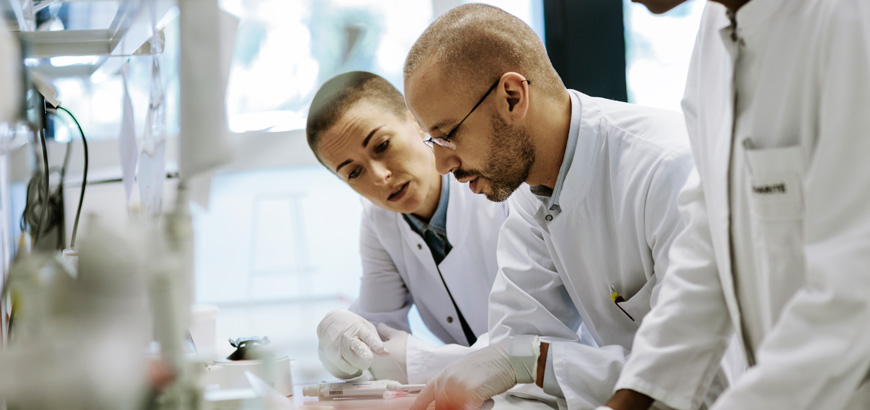Read Time: 6 minutes
The 2024 American Society of Clinical Oncology (ASCO) Annual Meeting is one of the most important annual events for unveiling new insights, technologies and treatments in oncology. This year while ASCO was underway, Endpoints News — a leading source for biopharma news — hosted a live panel to discuss insights and solutions that address accessibility challenges and solutions in cancer care.
The panel was moderated by Surani Fernando, healthcare journalist, writer, and producer of Raising Biotech Podcast.
Panelists were:
- Jason Hammonds, chief operating officer, Oncology & Specialty, McKesson
- Barry V. Fortner, Ph.D., vice president, U.S. Oncology Medical Affairs, Daiichi Sankyo, Inc.
- Amy C. Moore, Ph.D., vice president, Global Engagement and Research Partnerships, LUNGevity
- Ishwaria M. Subbiah, MD, MS, FASCO, executive director, Cancer Care Equity & Professional Wellness, Sarah Cannon Research Institute (SCRI); medical director, Supportive Care Oncology, Health Equity & Professional Well-being, The US Oncology Network
See below for some highlights from this moderated panel discussion.
What are some of the greatest challenges in addressing equitable access in cancer care?
According to Barry Fortner, a leader in community oncology and advocate for viable oncology policy,
the industry has made remarkable advances in both five-year and progression-free survival over the last three decades.
“The development of infrastructure to deliver sophisticated treatments throughout every corner of the country is a beautiful story that has transitioned cancer care from an inpatient model to an outpatient model,” Fortner said.
When striving to make cancer treatments available to every patient, inequities in care should draw special attention. Jason Hammonds, who has almost two decades of experience in oncology, shared that one of these barriers is obtaining biomarker testing in patients with advanced cancer. People from different backgrounds including socioeconomic status, geography, race, language, and others, are less likely to undergo biomarker testing due to cost and access. Yet, biomarker testing is a first key step to identifying potential clinical trials and precision therapies for patients.
Amy Moore, a trained virologist and cancer researcher with over a decade leading large research initiatives said, “The unfortunate reality [is] that far too many people in this country can't access the advances that are happening rapidly in our field. … Far too many aren't going to benefit from care they need as they're not getting tested for biomarkers at the rates we would like to see.”
“Research plays a vital role in addressing access disparities and should not be a last resort or not an option, but rather a pathway to providing the best possible treatment for patients based on their specific diagnosis,” Hammonds added. “Increasing diversity in clinical trials is crucial to ensuring that underrepresented communities have access to cutting-edge treatments and interventions. Research efforts should focus on understanding what these barriers are and ensuring that participation is encouraged.”
What are some of the best practices that make a difference in access, especially for underserved populations?
Virtual engagement has emerged as a driver of accessibility for both patients and physicians.
“Patients can now access a consult with an oncologist, receive treatment advice, and even access supportive care from the convenience and comfort of their homes,” Hammonds continued. “This not only reduces the burden of travel but can also open treatment up to those who may not be able to access facilities otherwise. Beyond patient convenience, healthcare professionals can remotely monitor a patient's progress, provide educational resources, or even facilitate multi-specialty care. Virtual engagement has emerged as a really powerful tool to help overcome geographical barriers and increase access to specialized care, particularly for underrepresented communities.”
Oncology care today is inherently multidisciplinary, and dynamic communications driven by virtual technologies help overcome location and travel barriers while fostering efficient collaboration that yields comprehensive and quality care for patients. This also allows engagement with community providers to identify other access barriers — like biomarker testing — and incorporate more reflex testing to drive eligible patients towards clinical trial inclusion and precision treatments.
What are the top challenges for inclusivity and diversity in clinical trials?
Ishwaria M. Subbiah, a medical oncologist and palliative care physician with global expertise in cancer symptom management and trial participation among older adults and other underrepresented communities, highlights that the inherent complexities in design and implementation of clinical trials have differing levels of impact on the individuals seeking care. These differences often drive the inclusivity and diversity of that trial.
Clinical trial challenges comprise inclusion of smaller and more targeted patient populations, awareness of oncologists about active trials and broad clinical trial awareness and comfort levels among patients, as well as access to screening, biomarker testing, and trial availability across clinics in the country.
“When we talk about the clinical trial process as a pipeline from screening to enrollment to treatment and completion, there are so many junctures with cracks from the individual complexities that lead to leaks, i.e., the loss of individuals no longer considering that study or patients ending their participation early,” said Subbiah. “We must make clinical trials easier by systematically and definitively addressing each complexity for both patients and families, as well as their oncologists to consider, if we are to reduce the gross disparities seen in clinical trial participation across diseases, especially oncology, today.”
How can pharmaceutical companies, community oncologists, and healthcare systems work together to try to solve some of the access challenges in the oncology space?
Oncology care involves numerous steps, starting with identifying symptoms and receiving a diagnosis, to referrals and appointments — with a variety of specialists and clinics — to pharmacy pickup or administration of medications, to follow-up care and monitoring. Real-world data can deliver a broad view of any treatment’s effect, providing key insights that support a positive and impactful end-to-end experience.
Such insights from real-world data can better inform not only the cancer treatment pathway itself, but also the optimal clinical approach to management of side effects. The more data we have, the better, and faster, we can provide treatment options to more diverse populations. But that statistical data must be considered alongside patient feedback.
Another area for collaboration, according to Subbiah, is “empowering every healthcare professional including counselors, social workers, medical assistants, and community organizers to serve as trusted points of information for patients and families looking to better understand clinical trials, in general. We want to go further and raise awareness across healthcare teams about various programs and initiatives that promote access, so teams feel activated to guide their patients and partner with us towards solutions.”
What learnings can we take and advance in a positive way about access challenges in cancer care?
Every stakeholder needs to continue to communicate and collaborate — from biopharma to distributors, care teams, advocacy groups, patients, and caregivers. Transparent and active discussions and maximization of tools and data help ensure access to cancer care. By removing each complexity, care in effect becomes more equitable for every person with cancer.
“The insights from this panel discussion reinforced that we should feel incredibly optimistic that access to cancer care is a priority across the U.S. and globally,” Subbiah concluded. “There is more work to be done, and we look forward to continuing to collaborate across the industry to improve access to cancer care.”
View the on-demand Endpoints News event here.




Share
Post
Post
Email